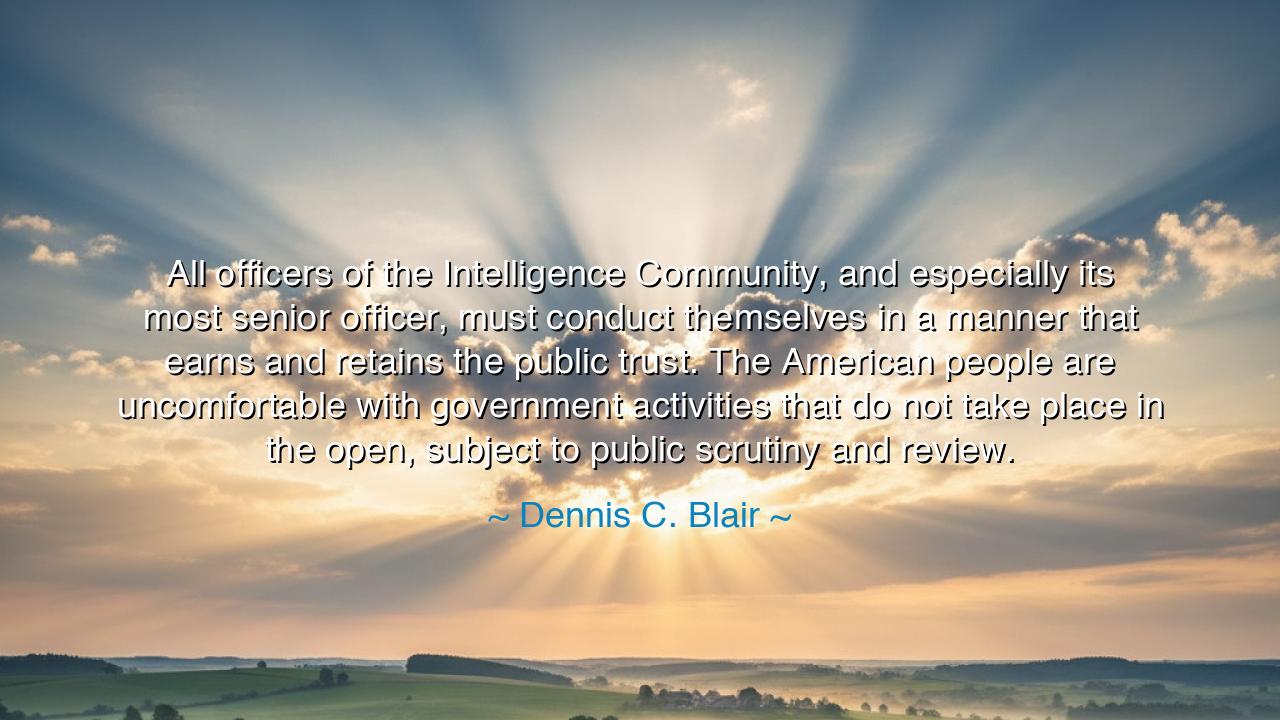
All officers of the Intelligence Community, and especially its
All officers of the Intelligence Community, and especially its most senior officer, must conduct themselves in a manner that earns and retains the public trust. The American people are uncomfortable with government activities that do not take place in the open, subject to public scrutiny and review.






When Dennis C. Blair, the former Director of National Intelligence, declared, “All officers of the Intelligence Community, and especially its most senior officer, must conduct themselves in a manner that earns and retains the public trust. The American people are uncomfortable with government activities that do not take place in the open, subject to public scrutiny and review,” he was not merely giving instruction to the servants of the state — he was voicing a truth as ancient as leadership itself. His words are a call to honor, to accountability, and to transparency, spoken from the heart of power to those who wield it in shadows. In that sentence lies both a warning and a creed: that power divorced from trust becomes tyranny, and secrecy without conscience becomes corruption.
The origin of this quote lies in the uneasy dance between freedom and security — the eternal tension within every republic. Blair, who served at the helm of the United States’ intelligence apparatus, understood this delicate balance better than most. The intelligence community must work in silence, hidden from the eyes of the people it protects. Yet it must also serve those very people — not rule them, not deceive them. It is a paradox older than democracy itself: how can a nation remain both safe and free when its safety depends on secrets? To this question, Blair gives his answer — through conduct rooted in integrity, and through humility before the people from whom all authority flows.
From the dawn of civilization, wise rulers have known that trust is the lifeblood of governance. When that trust is broken, even the mightiest empires crumble. Consider the story of Julius Caesar, who once crossed the Rubicon not simply as a general but as a man who believed himself above the law. Rome’s people, weary of corruption and secrecy, once placed their faith in the Senate — but found betrayal in every corner. What followed was not peace, but empire — a kingdom born from the ashes of a republic that had lost its public trust. Blair’s words, though modern, echo the wisdom the Romans forgot: that once the people no longer believe their leaders act in good faith, freedom dies in silence.
The American experiment, too, is built upon that sacred contract — that government exists only by the consent of the governed, and that even in matters of secrecy, there must be accountability. From the exposure of Watergate to the revelations of surveillance programs in the digital age, each scandal has struck at the same wound — the fear that the state may see too much, know too much, and care too little for the consent of its people. Blair, a man who had lived through such crises, knew that intelligence officers must not only protect the nation but also embody its principles. To serve in darkness is a grave duty; but to forget that duty is to become the very danger one was sworn to prevent.
There is also within Blair’s words a profound understanding of human nature. The people, he says, are “uncomfortable with government activities that do not take place in the open.” This discomfort is not weakness; it is wisdom. For the soul of a democracy must always question power. Where there is no questioning, there is no liberty. The people’s demand for transparency is the heartbeat of a free society — it is the reminder to those in command that they govern not by force, but by trust freely given. A true intelligence officer, then, is not merely a keeper of secrets; he is a guardian of trust, a silent sentinel who remembers that his ultimate allegiance lies not with a hierarchy, but with the people themselves.
History gives us another example — that of George Washington, who, though he commanded armies and could have ruled as a king, chose instead to relinquish his power. He understood that true authority does not arise from fear or secrecy, but from trust and example. When he laid down his sword and walked away from rule, he taught a lesson that every public servant must remember: power restrained by virtue is power that endures. Blair’s words are an echo of that same virtue — a reminder that the measure of leadership is not in how much one controls, but in how faithfully one serves.
The lesson, then, is clear: trust is the soul of governance, and integrity its unshakable foundation. For those who serve in positions of secrecy — in intelligence, in defense, in policy — let them remember that their silence is not license, but responsibility. Their unseen deeds must be guided by conscience as much as by command. And for the citizens who watch from the outside, let them continue to ask, to challenge, to demand transparency — for in doing so, they guard their own freedom.
So, my child, remember this: the darkness of secrecy can only be sanctified by the light of trust. Every leader, every servant, every citizen bears a portion of that light. Let none forget that governments, however powerful, exist not above the people, but because of them. For when trust is broken, no fortress, no intelligence, no might of arms can save a nation. But where trust is preserved — through honesty, humility, and honor — there, the soul of liberty shall endure, even in the shadows.






AAdministratorAdministrator
Welcome, honored guests. Please leave a comment, we will respond soon